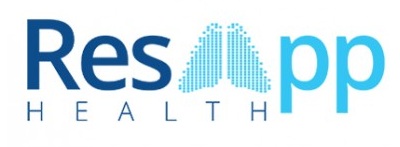ResApp is a digital health company that uses sound to screen, diagnose and manage diseases. Our proprietary AI-based technology uses audio signatures in cough, breathing or snoring sounds to identify conditions such as pneumonia, asthma, COPD and sleep apnoea. Uniquely, as we rely on sound analysis, our technology only requires a smartphone – our technology uses the built-in microphone and does not require any accessories or additional hardware. Our software solutions are apps that can be easily downloaded.
SleepCheck is our latest app which allows users to identify their risk of sleep apnoea using their smartphone. Sleep apnoea is a common breathing disorder, affecting roughly three in ten men and two in ten women. However, roughly 80% of people with sleep apnoea don’t know they have it. Untreated, sleep apnoea not only causes daytime tiredness, an increased risk of car accidents and lower productivity, but is also linked to an increased risk of heart disease, stroke and type 2 diabetes.
SleepCheck listens to your snoring and breathing sounds overnight and provides you with an indication of your level of risk of sleep apnoea, from low to very high. You simply place your smartphone on a bedside table before you go to sleep and in the morning you are presented with a report and the next steps that you can take. It is very easy to use, especially when compared to a traditional sleep study which often requires an overnight stay in a clinic, connected to multiple wires monitoring you while you are asleep.
Importantly, SleepCheck is clinically-validated and CE Marked as a medical device in Europe. This means we have run head-to-head clinical studies against the traditional sleep study, showing that SleepCheck is accurately able to identify your risk of sleep apnoea.

How did you come up with the idea for the company and the SleepCheck application?
ResApp was spun-out of the University of Queensland. The initial research was performed by Dr Udantha Abeyratne, who was funded by the Bill and Melinda Gates Foundation to find a low-cost diagnostic test for pneumonia that could be used in low-income countries. Dr Abeyratne’s team developed the initial cough-based algorithms.
Working closely with Dr Abeyratne, Brian Leedman (an experienced biotech entrepreneur) and Dr Paul Porter (our clinical partner) we formed ResApp around Dr Abeyratne’s technology and also the realisation that because these algorithms relied on sound, anybody with a smartphone could have access to a clinical-grade tool for respiratory disease.
SleepCheck is our second product and was formed through our collaboration with Dr Philip Currie and Dr Ivan Ling.
We knew that undiagnosed sleep apnoea was a major health and economic issue and also that sound-based analysis of sleep had been researched previously, including by Dr Abeyratne at the University of Queensland. However what was holding this back was the need for large clinical studies, especially in the home environment – where we believe a screening tool such as SleepCheck could have the greatest impact.
With Doctor Currie and Ling’s help, we recruited over 1,000 patients in the sleep lab as well as in people’s homes to record data for training new AI-based algorithms and then testing those algorithms. As a result, we built SleepCheck, moved it through the regulatory process to obtain a CE Mark, and it’s now available on the iOS App Store.
More from Interviews
- A Chat with Kebbie Sebastian, CEO and Founder of Merge
- Meet Dr Agnès Leroy, GPU Director at Cryptography Tool: Zama
- Meet Roman Eloshvili, Founder of ComplyControl
- Inside Mobile Payments with Bojoko’s Ville Saari
- Meet Steve Haskew, Group Director of Sustainability and Growth At Circular Computing
- A Chat with Hakob Astabatsyan, CEO and Co-Founder of Synthflow AI
- Meet Ernesto Suarez, CEO at Travel Insurance Provider: Gigasure
- Under Pressure and On the Clock: Gurhan Kiziloz’s Nexus International to Hit $1.45B Revenue in 2025
What can we hope to see from ResApp in the future?
We now know that audio is a great way to gather information about lung health, and it’s easily recorded using devices that you have on you, or in your home.
Today, we are focused on providing solutions for clinicians to accurately assess telehealth patients with respiratory symptoms with our ResAppDx app, and help users self-assess their risk of sleep apnoea using our SleepCheck app.
Tomorrow, your watch, phone and smart speakers will monitor your cough, breathing and snoring sounds, using sophisticated algorithms to predict if you are heading towards a health problem. You will then be provided with the clinical support you need, perhaps by taking preventative steps to stop things from getting worse or by connecting you to a doctor via telehealth.
Incredibly, all of this will occur before you have even thought to reach out to a doctor.
What advice would you give to other aspiring entrepreneurs?
I’m sure many have said this before, but they say it because it is true: you need to hire great people. Finding the right people, whom you can trust, is an important part of moving forward in the right direction. In most companies – and even more so in the health-tech space – you need expertise in so many different areas. From raising capital to managing engineering and product, to regulatory and clinical, and to sales and marketing, a wide variety of expertise and experience is needed.
It’s important that you find great people who can work together. Similarly – and again, even more so in health-tech – partnerships are key. There are so many great organisations out there who can help your company move forward – find them and build strong, long-term relationships.
Finally, grit and resilience are important. By definition, you are doing something nobody, or very few, have done before. You’ll get knocked down a few times. Get up and keep moving. It’s never a straight line.



